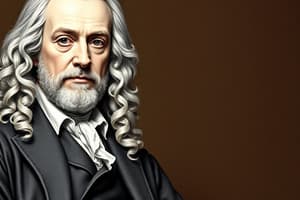Podcast
Questions and Answers
What was the primary focus of John Locke's ideas regarding the relationship between government and natural rights?
What was the primary focus of John Locke's ideas regarding the relationship between government and natural rights?
- The divine right of kings
- The structure of civil society
- The notion of natural rights as God-given (correct)
- The role of reason in human decision-making
What is the primary motivation driving human beings, according to Locke?
What is the primary motivation driving human beings, according to Locke?
- The pursuit of happiness
- The preservation of social order
- The advancement of personal interests (correct)
- The attainment of wisdom
What is the relationship between liberty and property, according to Locke?
What is the relationship between liberty and property, according to Locke?
- Liberty is a natural right, while property is a social construct
- Liberty is a product of property ownership
- Liberty and property are mutually exclusive
- Property is a means of exercising liberty (correct)
What does Locke mean by the term 'natural' in the context of natural rights?
What does Locke mean by the term 'natural' in the context of natural rights?
What is the implication of the equality of natural rights among all people, according to Locke?
What is the implication of the equality of natural rights among all people, according to Locke?
What is the primary motivation for individuals to form a society, according to Locke?
What is the primary motivation for individuals to form a society, according to Locke?
What is the main characteristic of the state of nature, according to Locke?
What is the main characteristic of the state of nature, according to Locke?
What is the relationship between liberty and property in Locke's civil society?
What is the relationship between liberty and property in Locke's civil society?
What is the implication of individuals forming a society, according to Locke?
What is the implication of individuals forming a society, according to Locke?
What is the primary goal of Locke's civil society?
What is the primary goal of Locke's civil society?
Study Notes
John Locke's Contributions
- John Locke is the most influential Enlightenment thinker, making significant contributions to ideas on government and natural rights.
Human Nature and Natural Rights
- According to Locke, humans are autonomous, independent individuals capable of reason and driven by personal interests.
- Humans' most important interest is survival, seeking to make their lives secure and comfortable.
- To achieve security and comfort, humans acquire property.
- Locke identifies two key aspects of human existence: liberty (independence) and property (to maintain that independence).
- These two aspects are considered natural rights, essential for human existence, and allow people to survive and be secure.
- Natural rights provide equality among all people, as all humans share the same rights to liberty and property.
Civil Society
- Locke suggests that the state of nature is inconvenient and can be improved by cooperating with others.
- To improve security and comfort, humans form societies that respect liberty and property rights.
- In a society, liberty may not be absolute, but individuals should retain as much liberty as possible.
- Property rights should be maximized, consistent with maximum liberty.
Key Principles
- Locke rejects the divine right of kings, emphasizing the importance of natural rights and human equality.
- His ideas emphasize the significance of reason, autonomy, and individual interest in shaping human existence and civil society.
Studying That Suits You
Use AI to generate personalized quizzes and flashcards to suit your learning preferences.
Description
Explore the influential ideas of 17th century English philosopher John Locke on government, natural rights, and civil society, as outlined in his Two Treatises of Government.





